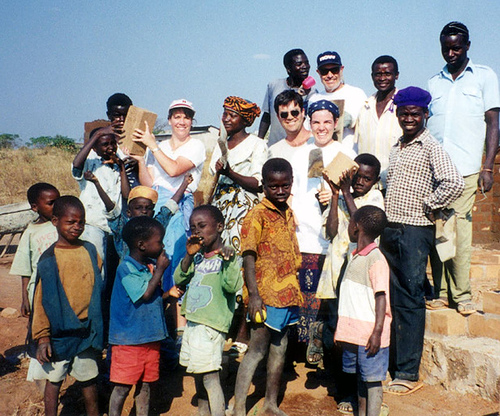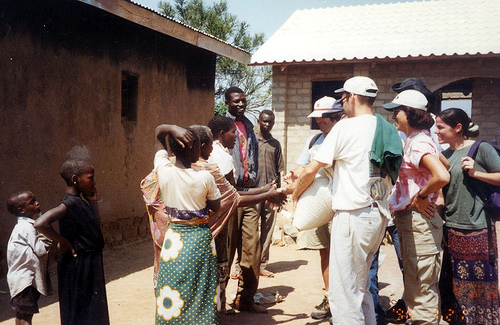This was part of a letter I sent to people that donated to my Habitat for Humanity trip to Tanzania. It includes an overview of the work we did there.
After spending two days in the city of Arusha, the group of 18 Habitat volunteers headed to the very small village of Nkinga. When I say “headed” I mean we flew in on tiny planes (we had to weigh ourselves and our luggage before getting on the plane and because I was in the front seat, I had the opportunity to steer for a bit) and upon landing we were surrounded by a large portion of the 5000 Nkinga residents. Talk about a warm welcome. Exactly 3 people in our group spoke Swahili and about 6 people in the village spoke English. This of course made communication quite an adventure. The work days began at about 8am. We would then be given our assignment for the day and split off into different groups. The lack of electricity puts a whole different twist on house building. Everything was made from scratch. The houses were very simple- brick walls and tiles roofs. Ask 12 different people what the correct mix was for bricks and you’re sure to get 12 different answers. Each group was led by a “fundi” or skilled worker. At about 10:30am each morning, we would take a “chai” break. The future homeowner would provide tea and a snack for everyone who was working at the site. The snack was usually a big ‘ol sweet potato, some roasted peanuts, or papaya. Then it was back to the grind. We’d break for lunch at about 12:30, at which point I’d usually head back to my little room, and nap under the mosquito netting. Then it was back to work from 2:30 to 5pm.
The work days began at about 8am. We would then be given our assignment for the day and split off into different groups. The lack of electricity puts a whole different twist on house building. Everything was made from scratch. The houses were very simple- brick walls and tiles roofs. Ask 12 different people what the correct mix was for bricks and you’re sure to get 12 different answers. Each group was led by a “fundi” or skilled worker. At about 10:30am each morning, we would take a “chai” break. The future homeowner would provide tea and a snack for everyone who was working at the site. The snack was usually a big ‘ol sweet potato, some roasted peanuts, or papaya. Then it was back to the grind. We’d break for lunch at about 12:30, at which point I’d usually head back to my little room, and nap under the mosquito netting. Then it was back to work from 2:30 to 5pm.
During breaks from work, we’d often play with the children who liked to hang out at the worksite. They’re all great at playing soccer, but teaching them stick ball was quite the process. Children were also very impressed with blowing bubbles. I learned basic Swahili counting from a group of kids who would write a number in the sand and then say the Swahili word for me. While we were in Nkinga, we were able to finish two houses and begin three other houses. Plus we were able to make a large donation to the local HFH affiliate. But the experience wound up involving so much more than just building. From eating chipati and ugi, to watching a traditional dance competition, to teaching hundreds of Swahili speaking children the hokey pokey, to dressing up in katenges (the skirts and headdresses that the women wear) and trading recipes and cooking dinner with the women, to getting used to the lack of plumbing and electricity, to learning to greet the lizards and large nameless bugs with a smile, to sharpening my charade skills in order to communicate things like “how much cement should be in this mixture of spackle?”, the trip was a huge learning experience. Everyone we met was extremely friendly. Most of the people seemed very happy except the poverty was very extreme. The schools were in bad conditions and lacked teaching materials as well as a sufficient number of desks and chairs. One man said to me, “Oh…social worker Mary….please tell your friends in America what you saw here. We are very happy but we need help. We do not have the resources that you do in America. So we appreciate everything that your group has done for us.”
While we were in Nkinga, we were able to finish two houses and begin three other houses. Plus we were able to make a large donation to the local HFH affiliate. But the experience wound up involving so much more than just building. From eating chipati and ugi, to watching a traditional dance competition, to teaching hundreds of Swahili speaking children the hokey pokey, to dressing up in katenges (the skirts and headdresses that the women wear) and trading recipes and cooking dinner with the women, to getting used to the lack of plumbing and electricity, to learning to greet the lizards and large nameless bugs with a smile, to sharpening my charade skills in order to communicate things like “how much cement should be in this mixture of spackle?”, the trip was a huge learning experience. Everyone we met was extremely friendly. Most of the people seemed very happy except the poverty was very extreme. The schools were in bad conditions and lacked teaching materials as well as a sufficient number of desks and chairs. One man said to me, “Oh…social worker Mary….please tell your friends in America what you saw here. We are very happy but we need help. We do not have the resources that you do in America. So we appreciate everything that your group has done for us.” Getting to know my fellow American Habitat volunteers was a whole separate learning experience. We ranged in age from 15 to 78. There was a father/daughter pair. A brother/sister duo. A newlywed pair who made the Habitat experience a stop on their honeymoon trip around the world. Then we had Olive, the 78 year old woman who could lift rocks that were about 3 times her weight. Olive also recently went to clown school and brought her costume and did a show for the kids.
Getting to know my fellow American Habitat volunteers was a whole separate learning experience. We ranged in age from 15 to 78. There was a father/daughter pair. A brother/sister duo. A newlywed pair who made the Habitat experience a stop on their honeymoon trip around the world. Then we had Olive, the 78 year old woman who could lift rocks that were about 3 times her weight. Olive also recently went to clown school and brought her costume and did a show for the kids.
I could go on and on but I’ll stop now. The bottom line is that I am so thankful for each of you for helping to make this trip possible for me. Not only did you do a great service for the people of Nkinga and Habitat for Humanity, but you played a very important part in what was definitely one of the best experiences of my life.
Wednesday, March 5, 2008
HFH trip to Tanzania: July 1998
Labels:
Habitat for Humanity,
Past Volunteer Trips,
Tanzania
Subscribe to:
Post Comments (Atom)

No comments:
Post a Comment